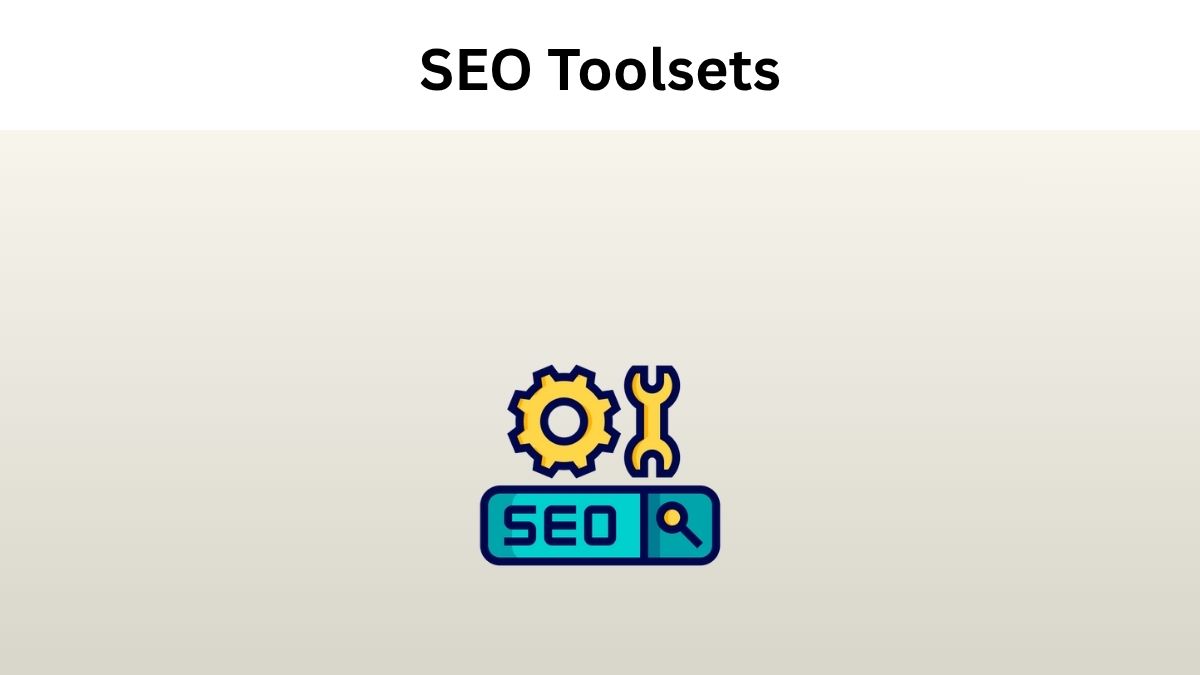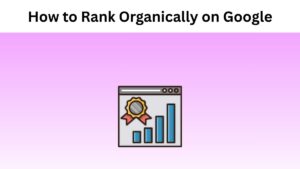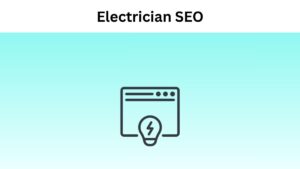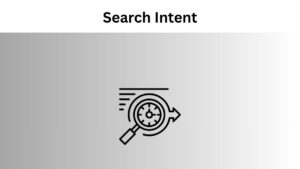Search engine algorithms are always shifting. Ranking high today doesn’t mean you’ll still be there tomorrow. Without the right tools, maintaining visibility in search results can be challenging. You put in the work—blog posts, keywords, backlinks—but your site still doesn’t climb.
That’s where SEO toolsets come in—they don’t just save you time. They help you work smarter. According to HubSpot, businesses that actively track their SEO performance are 2x more likely to see a higher ROI from their content marketing efforts. With the right tools, you can find better keywords, fix website issues, track your ranking, and spy a little on your competitors (ethically, of course).
This guide will explore the top 10 SEO toolsets that you need. Each tool offers a wealth of features to enhance your traffic, increase visibility, and maintain your competitive edge. Let’s dive in.
Top 10 Best SEO Toolsets
Yoast SEO
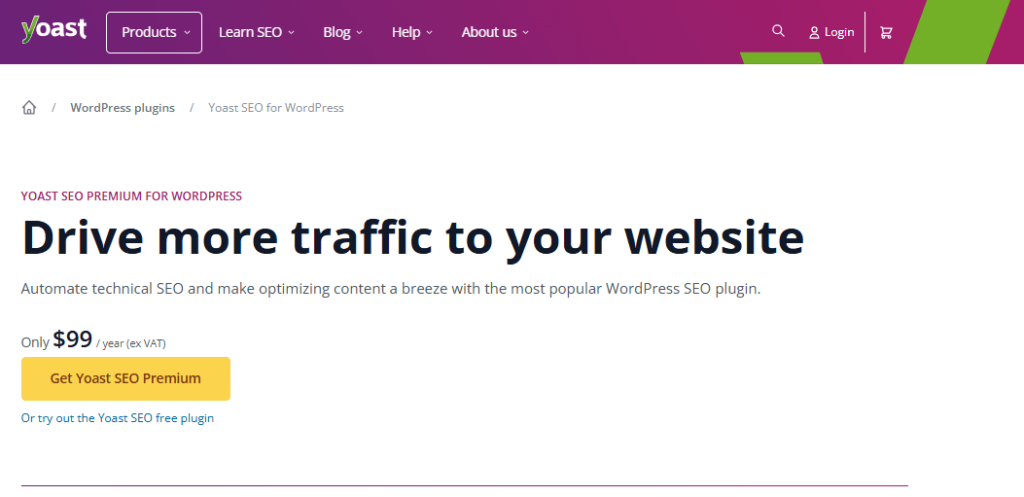
Yoast SEO is one of the most popular SEO plugins for WordPress users. It’s been around for years and continues to evolve. The tool helps you optimize on-page content like blog posts, service pages, and even product listings. It’s especially handy for beginners. You don’t need to be an SEO expert to use it.
Once installed, Yoast walks you through improving your content. It checks your keyword usage, readability, meta tags, slugs, internal links, and more. There’s a traffic light system—green is good, orange means okay, and red says it needs work. It’s simple, visual, and easy to follow.
The best part? It also helps you manage technical SEO, like generating an XML sitemap and editing robots.txt files. That way, search engines can crawl your site the right way without needing to touch a code.
Pros:
- Beginner-friendly interface
- Real-time content analysis
- Built-in readability checker
- Helps with both content and technical SEO
- Works directly inside WordPress
Cons:
- Some advanced features are locked behind the premium version
- It can slow down your WordPress site if your hosting is weak
- Doesn’t provide keyword research—needs to be used with another tool
Also Read: GenYouTube – YouTube Video Downloader
Ettvi
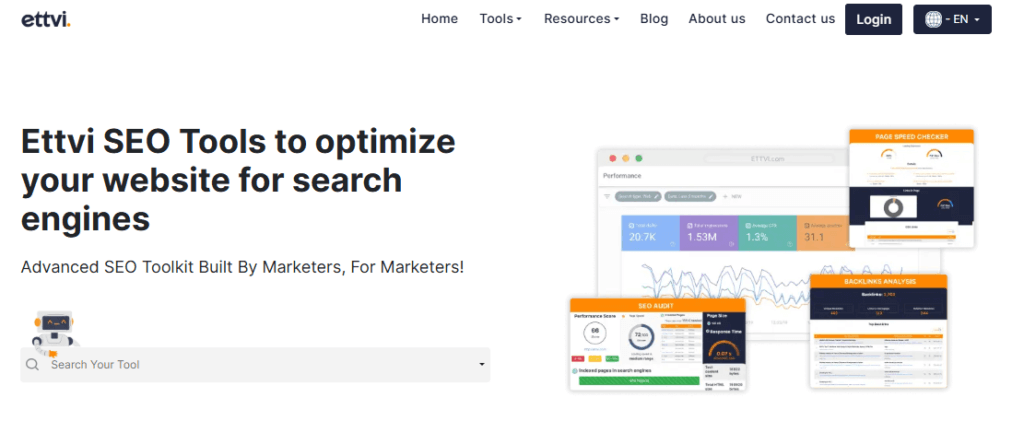
Ettvi is a powerful all-in-one SEO toolset designed to simplify your workflow. It combines multiple tools under one roof—so instead of switching between platforms, you can manage everything in one place. If you’re a digital marketer, SEO agency, or solo website owner, Ettvi offers smart solutions to boost your online visibility.
What makes it stand out? Ettvi is packed with over 60 advanced SEO tools, including keyword research, SERP analysis, a backlink checker, a technical audit, and even an AI-powered content generator. The interface is clean, fast, and easy to use—even if you’re not tech-savvy.
Pros:
- Wide range of tools in one dashboard
- AI-powered content creation and optimization
- Offers SERP previews, keyword clustering, and on-page analysis
- Frequent updates and new features
- Ideal for beginners and agencies alike
Cons:
- Some tools may feel overwhelming at first due to the volume
- Advanced users may still prefer pairing it with other niche tools like Ahrefs for deeper backlink data
Keyword Insights
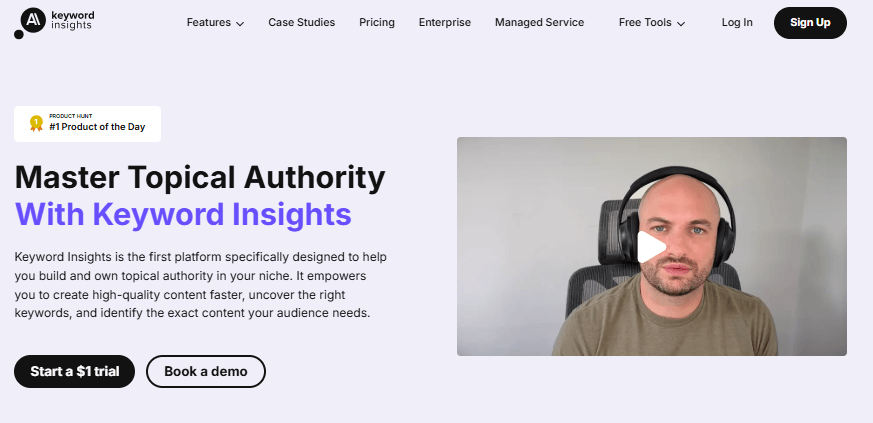
Keyword Insights helps you turn keyword research into a solid content strategy. It goes beyond just showing search volume or keyword difficulty. This tool uses AI to group keywords into topics and tells you which need their own page or can be clustered together. It’s a smart way to avoid cannibalizing your own content.
You also get real-time SERP data, search intent detection, and a content brief builder. It’s perfect if you want to speed up content planning and make sure you’re writing what people are actually searching for.
Pros:
- Keyword clustering and intent analysis
- Helps plan content that ranks
- Fast and simple to use
Cons:
- Limited backlinks or technical SEO tools
- It may not suit users who want a full SEO suite
Semrush
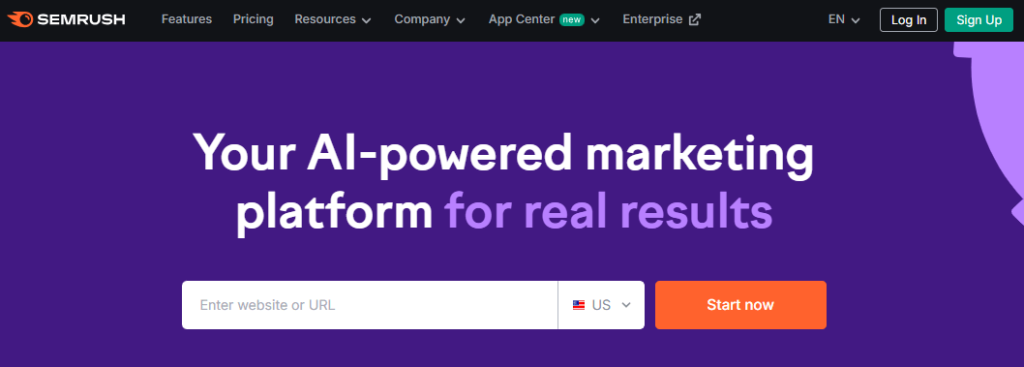
Semrush is a top-tier SEO tool trusted by marketers worldwide. It offers over 55 tools for SEO, content marketing, PPC, and competitive research. With it, you can do keyword research, track rankings, audit your site, analyze backlinks, and even spy on your competitors’ traffic and ad strategies.
What makes Semrush shine is its depth of data. It pulls detailed reports that help you make smart, data-driven decisions. Whether you’re optimizing blog posts or planning paid campaigns, this tool has you covered.
Pros:
- All-in-one digital marketing platform
- Excellent competitor analysis
- Powerful keyword and backlink tools
Cons:
- Steeper learning curve for beginners
- Expensive for freelancers or small teams
Surfer SEO
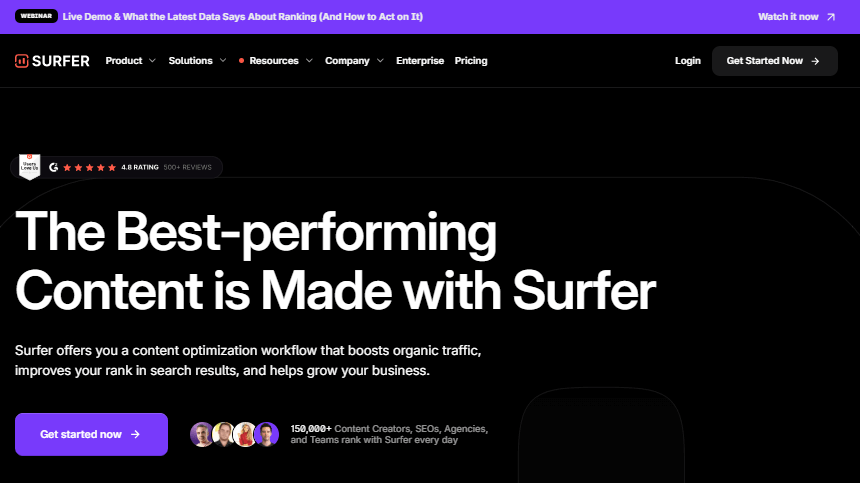
Surfer SEO focuses on content optimization. It analyzes top-ranking pages for your keyword and tells you what your content needs—word count, headings, keywords, images, and structure. It’s like a cheat sheet for a content writing platform that ranks.
You also get a content editor, keyword suggestions, and a content audit feature to fix old blogs. Surfer pairs well with tools like Jasper for AI writing.
Pros:
- Smart content guidelines based on SERP data
- Easy-to-use editor
- Speeds up content creation
Cons:
- Doesn’t do technical SEO or backlinks
- May lead to keyword stuffing if overused
Also Read: Best 33 Lead Generation Software
SEOptimer
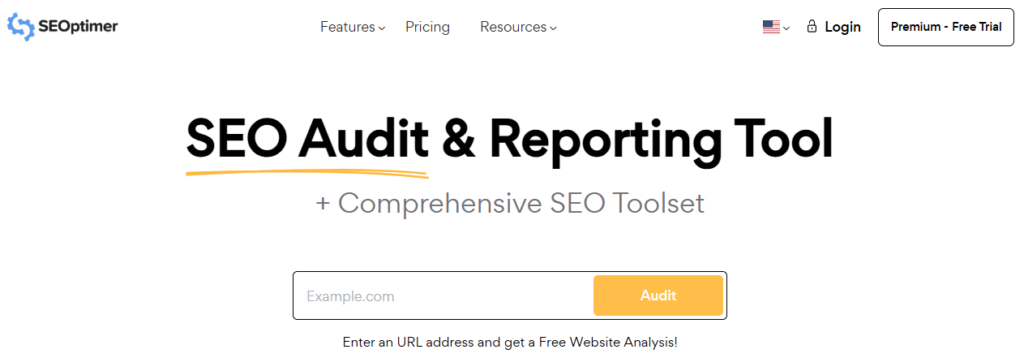 SEOptimer is a quick and easy SEO audit tool. It scans your website and gives you a simple report covering on-page SEO, performance, mobile-friendliness, and backlinks. Great for agencies—it offers white-label reports you can send to clients. It’s also beginner-friendly and doesn’t overwhelm you with data.
SEOptimer is a quick and easy SEO audit tool. It scans your website and gives you a simple report covering on-page SEO, performance, mobile-friendliness, and backlinks. Great for agencies—it offers white-label reports you can send to clients. It’s also beginner-friendly and doesn’t overwhelm you with data.
Pros:
- Fast, easy-to-read audit reports
- White-label PDF reports
- Affordable pricing
Cons:
- Not as deep as tools like Ahrefs
- No keyword research or content features
Ahrefs

Ahrefs is one of the most powerful SEO tools around. Known for its backlink database, it’s great for finding link-building opportunities and spying on your competitors. It also offers keyword research, rank tracking, content analysis, and site audits.
If you’re serious about SEO, Ahrefs gives you the insights you need.
Pros:
- Best in class for backlink analysis
- Great keyword and content tools
- Clean and detailed interface
Cons:
- Pricey, especially for beginners
- No free plan
Screaming Frog

Screaming Frog is a website crawler that digs deep into your site’s technical health. It scans every page for broken links, missing tags, duplicate content, and more. It’s a desktop app, not cloud-based, so it runs on your machine. This tool is perfect for SEO professionals doing site audits.
Pros:
- Fast and detailed technical audits
- Finds issues missed by browser-based tools
- Custom filters and advanced options
Cons:
- Not beginner-friendly
- No keyword or backlink features
Clearscope
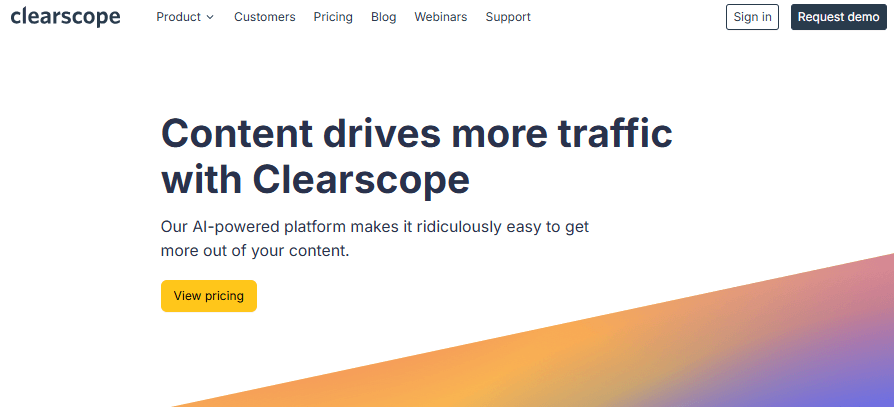
Clearscope helps you write content that ranks. It provides keyword suggestions, content grades, and competitor comparisons—all inside a clean writing editor. You enter your target keyword, and it shows what to include in your content to compete on Google. Writers love it for its simplicity and accuracy.
Pros
- Easy to use
- Content grade helps guide your writing
- Strong keyword recommendations
Cons
- Expensive compared to similar tools
- No technical or backlink tools
seoClarity
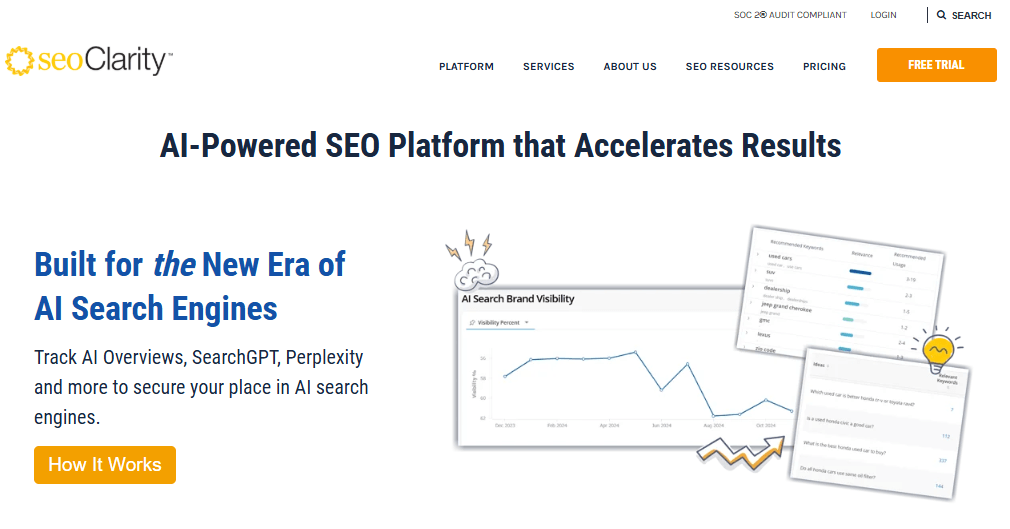
seoClarity is built for enterprises. It’s an all-in-one SEO platform offering everything from keyword tracking and site audits to AI-driven insights. Its strength lies in scale—you can manage thousands of pages, automate reports, and track performance with precision. It is particularly suitable for managing large teams and large websites.
Pros:
- Enterprise-level data and tools
- AI recommendations and automation
- Excellent support and training
Cons:
- Too complex for small businesses
- Pricing not listed publicly
Also Read: AI Tools For SEO Professionals
Final Words
SEO success is no longer about guessing. It’s about using the right tools to guide your strategy. The tools we talked about —like Yoast SEO, Ettvi, Semrush, and Ahrefs —can help you rank higher, write better, and grow faster, whether you are a solo blogger, a small business, or a big agency.
Each tool has its own strengths. Some focus on content, others on technical fixes or backlinks. The key is picking the ones that fit your needs and budget. You don’t need all 10, but using a smart mix will make your SEO game much stronger.
Remember, SEO isn’t a one-time task. It’s an ongoing effort. With the right toolset, you can stay ahead of Google’s changes and keep your site in top shape. So, explore these platforms. Try a few. And take control of your search performance—starting today.
